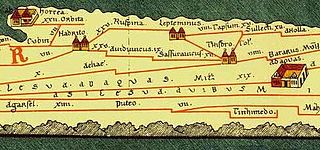Lucius Afranius was an ancient Roman plebeian and a client of Pompey the Great. He served Pompey as a legate during his Iberian campaigns, his eastern campaigns and remained in his service right through to the Civil War. He died in Africa right after the Battle of Thapsus in 46 BC.
Titus Labienus was a high-ranking military officer in the late Roman Republic. He served as tribune of the Plebs in 63 BC. Although mostly remembered as one of Julius Caesar's best lieutenants in Gaul and mentioned frequently in the accounts of his military campaigns, Labienus chose to oppose him during the Civil War and was killed at Munda. He was the father of Quintus Labienus.
Cornelia Metella was the daughter of Quintus Caecilius Metellus Pius Scipio Nasica and his wife Aemilia. She appears in numerous literary sources, including an official dedicatory inscription at Pergamon.

Sextus Pompeius Magnus Pius, also known in English as Sextus Pompey, was a Roman military leader who, throughout his life, upheld the cause of his father, Pompey the Great, against Julius Caesar and his supporters during the last civil wars of the Roman Republic.

Gnaeus Pompeius Magnus was a Roman politician and general from the late Republic.

The Battle of Thapsus was a military engagement that took place on April 6, 46 BC near Thapsus. The forces of the Optimates, led by Quintus Caecilius Metellus Scipio, were defeated by the forces of Julius Caesar. It was followed shortly by the suicides of Scipio and his ally, Cato the Younger, the Numidian king Juba, and his Roman peer Marcus Petreius.
Quintus Ligarius was one of the assassins of Julius Caesar. He had been accused of treason for having opposed Caesar in the civil war in Africa, but was defended so eloquently by Cicero that he was pardoned and allowed to return to Rome. He later conspired with Marcus Junius Brutus, with whom he assassinated Julius Caesar on 15 March 44 BC.

Hadrumetum, also known by many variant spellings and names, was a Phoenician colony that pre-dated Carthage. It subsequently became one of the most important cities in Roman Africa before Vandal and Umayyad conquerors left it ruined. In the early modern period, it was the village of Hammeim, now part of Sousse, Tunisia.
Publius Attius Varus was the Roman governor of Africa during the civil war between Julius Caesar and Pompey. He declared against Caesar, and initially fought Gaius Scribonius Curio, who was sent against him in 49 BC.

Caesar's civil war was a civil war during the late Roman Republic between two factions led by Gaius Julius Caesar and Gnaeus Pompeius Magnus (Pompey), respectively. The main cause of the war was political tensions relating to Caesar's place in the republic on his expected return to Rome on the expiration of his governorship in Gaul.
Publius Vatinius was a Roman politician during the last decades of the Republic. He served as a Caesarian-allied plebeian tribune in the year 59 – he was the tribune that proposed the law giving Caesar his Gallic command – and later fought on that side of the civil war. Caesar made him consul in 47 BC; he later fought in Illyricum for the Caesarians and celebrated a triumph for his victories there in 42 BC.

Leptis or Lepcis Parva was a Phoenician colony and Carthaginian and Roman port on Africa's Mediterranean coast, corresponding to the modern town Lemta, just south of Monastir, Tunisia. In antiquity, it was one of the wealthiest cities in the region.

Quintus Caecilius Metellus Pius Scipio, often referred to as Metellus Scipio, was a Roman senator and military commander. During the civil war between Julius Caesar and the senatorial faction led by Pompey, he was a staunch supporter of the latter. He led troops against Caesar's forces, mainly in the battles of Pharsalus and Thapsus, where he was defeated. He later committed suicide. Ronald Syme called him "the last Scipio of any consequence in Roman history."
Lucius Manlius Torquatus was a consul of the Roman Republic in 65 BC, elected after the condemnation of Publius Cornelius Sulla and Publius Autronius Paetus.
Marcus Considius Nonianus was a praetor in the late Roman Republic, holding the office around 55–50 BC. In 49 BC, as civil war was breaking out, the senate assigned him as propraetor to succeed Julius Caesar in the province of Cisalpine Gaul. He served in Campania.

Lucius Manlius Torquatus was a Roman politician and military commander. He was active during the Crisis of the Roman Republic and Caesar's Civil War. He commanded troops at the battles of Oricum, Dyrrhachium and Thapsus. The last of these ended the war, in a defeat for the faction Torquatus supported; he escaped the field, but was captured and killed shortly after. He is portrayed by Cicero in De Finibus as a spokesman advocating Epicurean ethics.

The gens Considia was a plebeian family at ancient Rome. The Considii came to prominence in the last century of the Republic, and under the early Empire, but none of them rose any higher than the praetorship.
The gens Ligaria was a minor family at ancient Rome, best remembered for three brothers who conspired against Caesar, and were afterward proscribed and put to death by the triumvirs. According to Cicero, they were of Sabine origin.
The Battle of Hippo Regius was a naval encounter during Caesar's Civil War which occurred off the coast of the African city of Hippo Regius in 46 BC. Metellus Scipio and a number of influential senators from the Optimate faction were fleeing the disastrous Battle of Thapsus when their fleet was intercepted and destroyed by Publius Sittius, a mercenary commander in the employ of the Mauretanian king Bogud, an ally of Gaius Julius Caesar's. Scipio committed suicide and all of the other senators were killed during the battle.